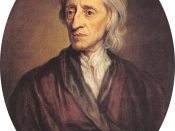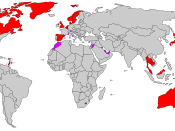--Overview: Reviews the Glorious Revolution, and states how the Constitutional Monarchy came to be, and how it differed from Absolutism.
The Constitutional Monarchy and Absolutism
Charles the First was sympathetic to Catholicism. He believed in the divine right of the monarchy. The Puritan influence in the U.K was rising. Parliament and the rising commercial class were having many conflicts and disagreements with the monarchy. The Parliament, an advisement council for the Monarch, was made up of two houses. The House of Lords, a small and non-powerful house composed of the old nobility. The House of Commons, a large and powerful house composed of the rest of the population elected by property and wealth.
Parliament's power was rising, and arguments ensued over money problems. The treasury of Britain was almost bankrupt. These conflicts led to Civil War in the mid 1640's. Charles failed an attempt on overthrowing Parliament, and was himself overthrown by Oliver Cromwell leading Parliament.
Charles was found of conspiracy with France, and he was executed in 1649 in public by beheading.
The constitutional monarchy arose in England at this time for numerous reasons.
Over the next few decades, England was in turmoil, seeing multiple leaders. Cromwell died few years after the coup. In an attempt to restore the crown, Charles II came to power with enough money to almost separate the monarchy from Parliament. Most of the money was donated from France, who Charles II kept close ties with. 1685, James II of the Stuart Family came to power, and proclaimed his son would restore Catholicism in England. This act was just one of the many that angered the Protestant Parliament. Many more differences in the next meetings of Parliament voted against James II.
James II later dissolved Parliament, who then turned to Dutch Protestants and the Duke...


